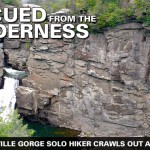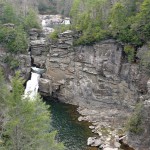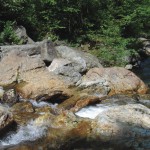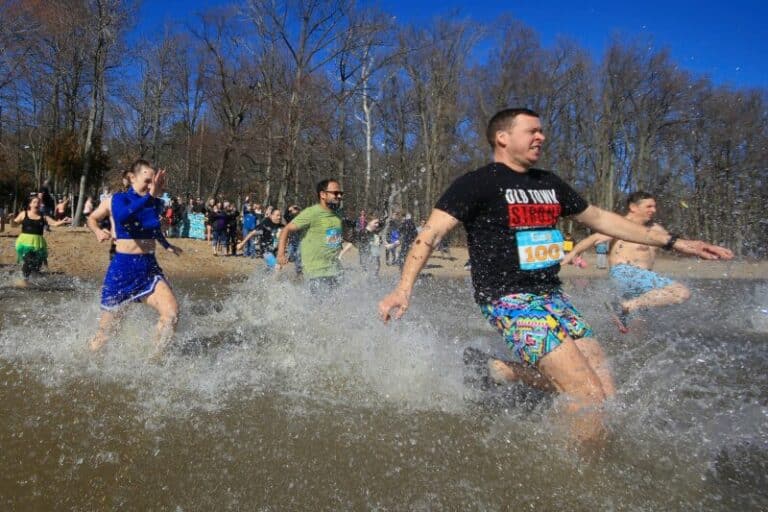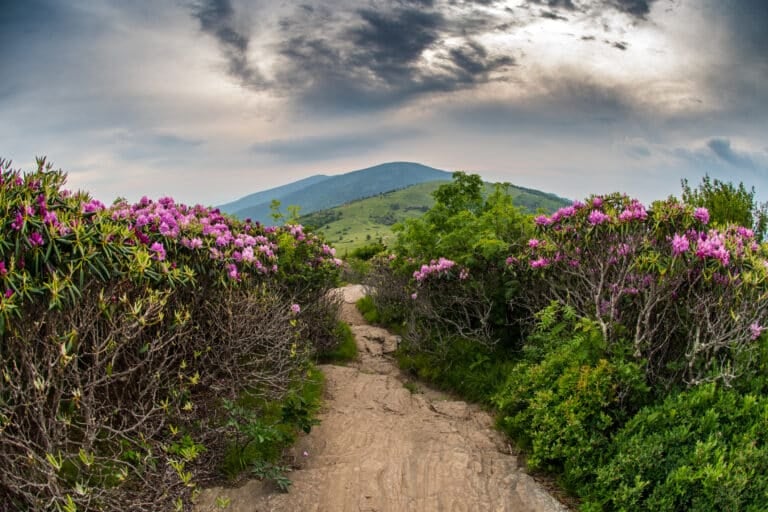I set out on a solo backpacking trip into Linville Gorge Wilderness last July. I descended into the deep chasm and headed downstream on the Linville Gorge Trail for about a mile before setting up camp on three large flat boulders in the middle of the river. After sleeping under the stars, I awoke the next day to do some boulder-hopping down the Linville River. I started off downstream with nothing but some swimming trunks, a pair of Keen river shoes, a bladder filled with filtered water on my back, and an energy bar in my pocket. My plan was to travel light and fast.
I spent three hours swimming, jumping, and clambering across rocks. I skidded down moss-covered rock water slides and plunged into deep pools. After an exhausting day of frolicking in the river, I decided to attempt one last rock hop before heading back to camp. I jumped onto a boulder in the middle of the river, and though I landed squarely on my feet, my muscles did not absorb the shock. My heels took the full brunt of the landing and fractured instantly.
I immediately knew I had broken some bones, so I just rolled down the rock into the river and pulled myself up onto a flat spot. I passed out of consciousness for a few moments, and when I awoke, I had to make a choice: should I lie there and wait for hikers to come upon me, or should I make an attempt to get out of the gorge on my own?
I could not put any weight on my feet, so my only option was hands-and-knees crawling. I nibbled a few chews of my bar, filled my water bladder from the river, and crawled toward a crossroad of trails near a footbridge. I lay on the sun-warmed rock to help bring my body temperature back up and scoured the skies for any fluke fly-over.
Amazingly, two helicopters flew over at that moment. I couldn’t believe my luck, and I frantically scrambled to my knees waving my shoes as mightily as I could. Unfortunately, my desperate flailing gained no attention. The sound of the twin chopper blades faded in the distance, and I once again sank into the melancholy awareness of my predicament.
By my calculations, I had a maximum of three nights before I would be found: I had told my wife I would be back in two days, and I was also due to teach a Yoga class at noon the following day. The question was: how cold would it get at night? Could I survive three nights in a deep mountain gorge wearing nothing but swimming trunks?
I was developing strategies to conserve precious body heat. Someone had left a pair of fairly sturdy socks on the flat rock where I was sunning myself, so I used them as a teeny blanket over my ribs. And if I lay on my river shoes, I could keep some bodily contact from the rock and thus limit its ability to suck the heat from my torso. I wrapped my arms around myself and curled into a ball to maximize skin on skin contact.
But then gray clouds gathered overhead, and soon the rain began to fall. A wet body would surely suffer from hypothermia and I couldn’t risk that.
I crawled over to a rock ledge with a large overhang beneath it. I lowered myself beneath the overhang, almost at river level. There I wedged into a small cranny, and curled up again to stay dry.
It rained for several hours, and when it let up, pitch black night descended under the cloud cover. I tried to rest, but I was already shivering and the physical shape of my cubbyhole was too tight, so I began the slow crawl out to the flat rock. I lay in several places that night, constantly trying to gently place my swollen, balloon-sized feet on the cold hard stone. It was the longest night of my life.
At the first sign of dawn, I resolved to make an attempt at reaching my camp, which meant access to food and warmth. That meant a two-mile crawl up the rocky gorge trail to my pack. Along the way, I found a metallic top to a discarded lighter, and I used it to cut holes in the ends of the socks. Then I threaded them gingerly over my bulbous feet to my knees, doubling them up like knee pads.
I found a rhythm of crawling by placing one shoe in front of me and placing my knee on it, then alternating hands and repeating with the other shoe and knee. In this fashion, I started crawling back up the trail to my base camp hoping to make it before dark. I calculated my progress to keep my mind occupied: one shuffle equaled about a half-meter; over two miles, that would require 6400 shuffles.
The day quickly grew hot and sweat dripped on the trail from by body. I was already running short on water. It had been 18 hours since I had fractured my heels, and it had given me much time to reflect. Mostly, I had thought of the people whom I loved and who loved me. I had a chance to truly evaluate all the ways in which my life had been blessed and to appreciate all the wonderful experiences I’d had.
All of these thoughts were swimming around in my head when I glanced up to see three hikers heading down the trail.
“My saviors! Boy am I glad to see you guys,” I exclaimed to the three young chaps standing before me. What a sight I must have been: on all fours with shoes under-knee, drenched in perspiration and as dirty as I have probably ever been in my life.
Greg, Luke, and Nick were college students from Greensboro and on an end-of-summer backpacking trip before the start of the fall semester. Apparently, Greg was an Eagle Scout, and immediately he pulled out a first-aid kit, a map, and a cell phone. Humorously enough, the shirt Luke chose to wear that morning read, “Yes, I can help you.”
Only text messages would go through Greg’s cell phone, so I sent one to 911 and one to my wife. The hikers gave me some food and water and we tried to decide what to do. My feet were really beginning to hurt now.
Greg hiked up the gorge to get a better cell signal and hopefully meet a rescue party. Nick went ahead to recover my backpack, while Luke stayed behind with me. I decided to keep crawling, so Luke ripped his tank top in two and tied my shoes directly to my knees. This allowed me to almost double my pace, not having to reach back for the shoe after each advancement. Eventually, I made it to a cleared campsite at the base of Sandy Flats Trail, which incidentally, is neither sandy nor flat, but rather straight up the gorge slope.
By now, my knees were getting raw and my wrists ached. I stopped to lay flat on my back in the shade and elevate my now throbbing feet on a stack of rocks. Forty-five minutes later, the first responders, Michael Brown, of Burke County E.M.S., and J.D. of the local fire department, arrived. They were a welcome sight indeed; I could almost smell the morphine in Michael’s backpack.
The first responders could hardly get a pulse and were concerned with the amount of swelling in my right foot, so they believed that a helicopter rescue was the best and quickest way to safely transport me out of the gorge. After about a three-hour wait, during which time the young saviors from Greensboro continued their trip with parting wishes, a man in full gear dropped out of a Blackhawk helicopter with a basket stretcher, loaded me in, and lifted me into the helicopter with a winch. I do wish my first ride in a helicopter had not been under such circumstances, but I certainly must commend the skill and swiftness with which the extraction took place.
An hour later, I was rolled into the operating room to be treated for two fractured heel bones. I have since had reconstructive surgery on my right heel with the addition of some plates and screws.
I had gone to the gorge to find myself and to cleanse my spirit. While I wouldn’t suggest it to anyone, an experience like this certainly has a way of stripping away all the chatter of my external being and leaving me with just the pure core of who I am. Most of all, my spirit has been lifted higher by the benevolent deeds of those around me in this crisis. I hope to have a chance to reciprocate their kindness and compassion.
